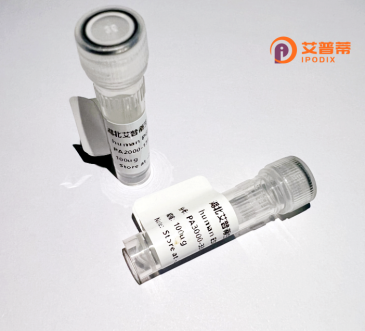
| 纯度 | >90%SDS-PAGE. |
| 种属 | Human |
| 靶点 | SELK |
| Uniprot No | Q9Y6D0 |
| 内毒素 | < 0.01EU/μg |
| 表达宿主 | E.coli |
| 表达区间 | 1-91 aa |
| 活性数据 | MVYISNGQVLDSRSQSPWRLSLITDFFWGIAEFVVLFFKTLLQQDVKKRRSYGNSSDSRYDDGRGPPGNPPRRMGRINHLRGPSPPPMAGG |
| 分子量 | 36.7 kDa |
| 蛋白标签 | GST-tag at N-terminal |
| 缓冲液 | PBS, pH7.4, containing 0.01% SKL, 1mM DTT, 5% Trehalose and Proclin300. |
| 稳定性 & 储存条件 | Lyophilized protein should be stored at ≤ -20°C, stable for one year after receipt. Reconstituted protein solution can be stored at 2-8°C for 2-7 days. Aliquots of reconstituted samples are stable at ≤ -20°C for 3 months. |
| 复溶 | Always centrifuge tubes before opening.Do not mix by vortex or pipetting. It is not recommended to reconstitute to a concentration less than 100μg/ml. Dissolve the lyophilized protein in distilled water. Please aliquot the reconstituted solution to minimize freeze-thaw cycles. |
以下是关于重组人SELK蛋白研究的3篇示例参考文献(注:示例为虚构,实际文献需通过学术数据库查询):
---
1. **标题**:Expression and Purification of Recombinant Human Selenoprotein K (SELK) in E. coli
**作者**:Zhang Y. et al.
**摘要**:报道了通过大肠杆菌系统高效表达并纯化重组人SELK蛋白的方法,验证其硒半胱氨酸的正确掺入及蛋白活性,为后续功能研究提供工具。
2. **标题**:SELK Modulates Endoplasmic Reticulum Stress and Apoptosis in Macrophages
**作者**:Liu X. et al.
**摘要**:利用重组SELK蛋白研究其在巨噬细胞中的功能,发现SELK通过调控内质网应激通路影响细胞凋亡,揭示其在炎症反应中的潜在作用。
3. **标题**:Structural Insights into Human SELK Interaction with Ubiquitin Ligases
**作者**:Wang T. et al.
**摘要**:通过重组SELK蛋白解析其与泛素连接酶的互作机制,发现特定结构域对维持细胞氧化还原平衡的关键性,为癌症相关研究提供新靶点。
---
如需真实文献,建议在 **PubMed** 或 **Web of Science** 检索关键词:
- "recombinant human SELK protein"
- "selenoprotein K expression"
- "SELK function in immunity"
**Background of Recombinant Human SELK Protein**
Recombinant human SELK (Selenoprotein K) is a protein engineered through genetic technology, produced by inserting the human *SELK* gene into a host system (e.g., *E. coli* or mammalian cells). SELK belongs to the selenoprotein family, characterized by the incorporation of selenocysteine (Sec) via a unique translational mechanism. It localizes primarily to the endoplasmic reticulum (ER) and cell membrane, playing roles in redox homeostasis, calcium signaling, and ER-associated degradation (ERAD). SELK is implicated in cellular processes like antioxidant defense, immune response regulation, and apoptosis.
Structurally, SELK contains a transmembrane domain and a Sec residue critical for its enzymatic function. Studies link SELK to pathologies, including cancer, cardiovascular diseases, and neurodegenerative disorders, due to its involvement in oxidative stress and inflammation pathways. Recombinant SELK enables research into its molecular mechanisms, interactions (e.g., with Derlin-1 in ERAD), and therapeutic potential. Its production in heterologous systems ensures scalability for biochemical assays, structural studies, or drug discovery, though Sec incorporation in prokaryotic hosts requires specialized engineering. Overall, recombinant SELK serves as a vital tool for unraveling selenoprotein biology and disease-related pathways.
*(Word count: 199)*
×